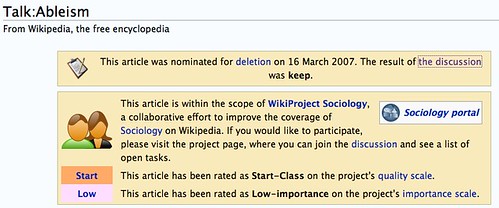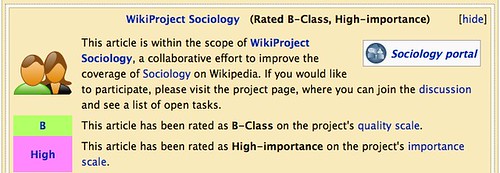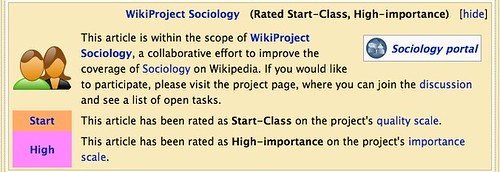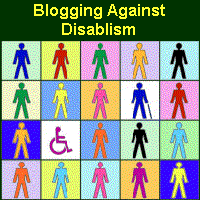More for Blogging Against Disablism Day.
I just poked around the entry for “Ableism” on Wikipedia. On the Talk page, I found a box placing the Ableism article within WikiProject Sociology:
“This article has been rated as Low-importance on the project’s importance scale.”
Ableism of low importance within Sociology? Erm, ooookay. Let’s have a closer look at their definition of “Low-importance”:
This article is of little importance to this project, but it covers a highly specific area of knowledge or an obscure piece of trivia.
20%, people. Disabled people form around 20% of the population in Australia and the USA (and similar numbers in similar societies). One in five. Discrimination is huge, it is institutionalised, it is very often legal. Disabled people are some of the most vulnerable, the most underemployed, the most abused, the most excluded, the most neglected, the most murdered people in our cultures.
“Low importance”? “Obscure piece of trivia”?
OK, so let’s have a look at some other big discriminations. Racism and sexism, are they categorised as obscure pieces of trivia too? (On Wikipedia, I wouldn’t be surprised…)
Sexism is of High Importance. OK. I agree.
So, racism. I guess the importance of racism within sociology, according to Wikipedians, would be, oh, about similar to that of ableism?
OK, so racism is of High Importance also. OK. I agree with that too.
So why is Ableism of Low Importance? Why does the biggest encyclopedia on earth consider it to be of lesser importance than discrimination against other minorities? Why are sociologists learning and being taught that racism and sexism are The Discriminations, that all others are secondary or tertiary or not really worth bothering about? Why, when a person is both female and PWD, or of colour and PWD, or all three, and/or lesbian, trans, non-citizen, working class, and so on, is ableism automatically ranked as the least important discrimination they’ll encounter? Why are PWD losing this Oppression Olympics, a game we shouldn’t be playing in the first place? (“Intersectionality” hasn’t yet received a rating on the Importance scale at Wikipedia.)
Other topics considered more sociologically important than Ableism (not equal, but more), as far as Wikipedians are concerned, include:
est and The Forum in popular culture
and Hooters.




